Dimitrios Spyridon Chytiris's Blog
September 28, 2025
Ineffable

Ineffable
Have you ever been so cold your skin feels like it’s on fire?That’s how I felt shortly after getting off the terra bus, down here, at theend of the world. My mobile phone insisted it was almost midnight, but the sunhadn’t gotten the memo and hovered over the horizon, a fat, motionless,lukewarm sphere, as if time stood still before my eyes.
The C-17 Globemaster III, the military aircraft that broughtus from New Zealand, was not designed to transport passengers, so I was gladwhen an announcement over the PA warned us that we were getting ready to land.Those who had attempted to get some downtime, strapped in their seats, stirredand yawned, massaging their sides, stretching limbs, and rubbing the sleep fromtheir eyes. I first met the team of scientists at Christchurch, New Zealand, atthe Clothing Distribution Centre, where they provided us with clothes and gearfor the cold weather. Three men and a young woman.
Dan, the German professor, unstrapped himself and knelt overhis PhD student, who had the sense to bring a sleeping bag and earplugs and wasstill resting motionless, her chest moving up and down slowly and rhythmically,to wake her up.
“You didn’t get any sleep?” asked Mathias, throwing his headback and running his fingers through his long hair in an unsuccessful attemptto tame it.
“How could I? These chairs are torture. And that noise, I canfeel it in here,” I thudded my fist against my chest. “A constant low vibratinggrunt that is thumping inside me.”
“We are almost there now. You will be able to get some properrest”.
Marta put away her sleeping bag and strapped herself to theseat between Christiaan, who never said a word or removed his headphonesthroughout the flight, and the professor. Even now, Dan seemed eager to impartknowledge to her. Perhaps a teaching habit he could not shake off. Marta,however, didn’t seem to bother. Her attention was focused on his every word,nodding slowly, taking in the information and asking for clarifications alongthe way.
Christiaan unstrapped himself from the seat, yawnedunashamedly and unsuccessfully tried to stifle a burp before reaching for hisbelongings. Mathias stared at him blankly. Rooted in place and through clenchedteeth, the gigantic man shook his head subtly and began collecting his things.All our paraphernalia was shipped to McMundus a fortnight ago. I felt nakedwithout my equipment.
The aircraft halted, and one by one we queued in front of thesquare cargo door. Slowly, a gaping mouth began to appear, allowing brightlight to creep in through the cracks, forcing us to avert our eyes. Amechanical, industrial humming lifted the top jaw upwards while the lower jawdescended to meet the ice runway. Finally, with a satisfying loud clunk, thecargo door latched securely and the crew signalled us to move forward.
The scene that met us outside the aircraft was surreal. Thepungent smell of fuel was a contrast to the clear, blinding brightness of thenever-setting summer sun. The light reflected off a vast white wilderness,which was littered here and there with remnants of human interference. Itsintensity was so strong that soon it became uncomfortable, followed by asensation of pricking needles assaulting my corneas. I closed my eyes, but thelight shone through my eyelids, making me feel as if I were infected by thewhite blindness described in Saramago’s Blindness.
“You should put on the glasses CDC gave us,” said Mathias.
“Yeah, I see that now,” I said, slipping on the glasses thatthe Clothing Distribution Centre in Christchurch equipped us with. “Is it goingto be like that the whole time?” I nodded to the sun.
“More or less,” he said shrugging.
It felt strange to see a little giant of a man being soattentive. He had the frame and the fair colouring that would make his Vikingancestors proud but none of the menace.
Right off the compressed ice runway, a tomato-red and white,fourteen-metre-long vehicle was waiting for us. The words “Ivan the TerraBus” were painted on either side of the bus in bold white capital letters.The inside was warm and comfortable, with wooden panelling and seats thatsmelled of hundreds of passengers, very different to the adverse atmosphere ofthe aircraft. The ride to McMundo station was slow and bumpy. The scenerylooked identical throughout the ride, and I could not stop wondering how someonewould manage to find their way around the continent when every surroundingfeature looked like a blank canvas.
“Are you ready for your survival training?” asked Mathias.
“You said you did it before, right? Is it hard?” I asked,stealing a look at the professor, who must have been in his early sixties.
“Well, it is demanding. You need to pay attention and takethe training seriously. It can make the difference between life and death. ButI suppose the simulation is not particularly physically demanding.”
“I thought so. If he can do it”, I pointed at the agedprofessor, “it can’t be that hard.”
He frowned. “It requires a certain level of endurance anddiscipline, and Dan has these qualities in spades. This is his third exhibitionin Antarctica.”
Approaching the station revealed its imposing size. More thana hundred buildings of scientific, logistics, housing and recreational naturespread out over two and a half square kilometres.
Ivan the Terra Bus brought us within ten minutes of thereception area. The change in temperature stepping out of the warm vehicle soonbecame apparent, but it was not a head-on attack. At first, the cold was awelcome, gentle breeze that felt pleasantly refreshing after eight hours ofbreathing stale human exhalations. Its low whistling hummed in my ears,reaching for the exposed flesh around my neck. I could see it gaining upon usin the steam escaping our breath. Marta’s unprotected earlobes were gleamingred, and I could feel mine burning. Minuscule ice crystals appeared overMathias’ moustache.
“God, are we sure it’s summer?” I said.
Dan smiled, “You don’t want to be caught here during winter,trust me.”
What did he mean by that? I can’t imagine he’d spend a wintertrapped here in frigid darkness. I began to contemplate whether the paycheckwould be worth all this hustle.
As we reached the climate-controlled building, I let out along, slow sigh of relief. The lengthy journey and the unforgiving cold hadbegun to take a toll on me. My neck was stiff and my joints ached. All I wantedwas to track my equipment and ensure everything was in order. Hopefully getsome rest for a few hours. They paired Dan with Christiaan, and I got to sharea room with Mathias. He seemed relieved by that, and when I asked him why thatwas, he said, “Well, I don’t think I have ever heard him speak…”,apologetically, which I thought was amusing. Marta got her own lodgings, atleast until her assigned roommate from another mission arrived in two days.
As soon as we were allowed to collect our equipment, I tookeverything out and started inspecting it. The cameras and lenses were inexcellent shape. I unpacked the hard drives and ran diagnostics on the laptopto check for errors.
While my bed was littered with batteries, tangled chargercables and a collection of lenses, Mathias’ bed remained untouched. With slow,measured grace, he stowed his clothes in the claustrophobic closet at the backof the room. He collected his backpack and leaned against the wall.
“You have a lot of batteries,” he raised his eyebrows.
“The cold impacts battery life. I didn’t want to chance it.”
He nodded softly.
“How about you? What did you bring?”
He weighed the question. “Nothing much…”. He pulled two itemsout of his backpack. One seemed to be a children’s book, all white with adrawing of a small boy dressed in old-fashioned clothes, titled Den LillePrinsen. The other was a yellow National Geographic featuring aclose-up of a male Javan Rhino on the cover. My cover. He put the book gentlynext to his pillow, fished a black marker from his inside pocket and presentedthe magazine and the marker to me. “Would you mind signing it?”
“Oh,” I managed to say, “how did you know?”
“The itinerary email included the names of the team membersand I looked you up.”
I remembered receiving that email, but I didn’t have the timeto go through it in detail.
“I would appreciate an autograph,” he went on, “my wife and Ilove the Javan Rhino, we are great admirers of your work.”
He was not kidding, “Sure, I’ll sign it.”
His eyes brightened. “I read you were nominated for theGerald Durrell award of wildlife for this photograph?”
“I actually won the award…”
“Incredible.” He folded his arms, and I saw his head tiltingslightly. Shadows appeared between his eyebrows, his eyes searching the room asif to find the right words to ask his question. “It’s the first clear pictureof the rhino in thirty-seven years.” He licked his lips, “How did you manage tocapture such a rare photograph?” He stared at me, listening.
“I don’t know,” I paused. “Nature is unpredictable. You needto be persistent and focus on your goal. It took me three days to get thatshot, but I got lucky.”
His eyebrows raised subtly, and he nodded. “What kept yougoing?”
“I needed a money shot.”
“I’m sorry, I don’t…” he started, squinting his eyesslightly.
“If my photograph made the cover, I’d get a lot of money,” Iexplained, and he nodded. “Not only from the magazine but from royalties,reprints, exhibitions, and so on.”
“Sounds rewarding. Thank you for your autograph, my wife isgoing to be very happy”.
“No problem”.
He stowed the magazine away and prepared to retire for thenight.
“So, is that why you’re here, for another money shot?”
I shrugged. “Yeah, hopefully. Why are you here?”
“I promised my son I’d take a photograph with an emperorpenguin”, he said and smiled.
I watched him fish for the children’s book from his pillow,flipping through its pages and clearing his throat.
“I need to record a video,” he explained, “for my son.”
“Go ahead.”
He sat cross-legged on the narrow bunkbed. He was holding hismobile phone in one hand and with the other he was turning the pages of thebook. His eyes widened and narrowed, his eyebrows raised and then fell. Hespoke gently and loudly, whispering and pausing for effect. And even though Idid not speak Swedish I could almost see the image form in front of my eyes. Icould not stop wondering how many photos I would have to take to capture thescene he was painting for his son through his exaggerated mannerisms, thechange in light in his eyes, and the quality of his voice.
I picked up my camera and, without shame, I started shooting.
Mathias noticed me, smiled and continued narrating.
I pressed the Display button on the back of the camera, andall I could see was a man holding a book and staring at his phone. Here I was,holding an eight-thousand-pound camera that had earned me two magazine coversand won me an award, but was unable to capture what I was seeing. Every shotwas wrong, inadequate. I set it down.
"God natt, jag älskar dig", he said, sending a kissand stopped recording. He turned to me apologetically. “My partner and I, wetake turns reading from The Little Prince to our son. Tomorrow is my turn, andsince I cannot do it in person…”, he shrugged.
I smiled. “I’ll help you take that penguin photo.”
Thank you for reading the story. If you enjoyed it, I would be grateful to hear your thoughts or questions in the comments below.August 26, 2025
Raging Titan

Raging Titan
We arrived at Piazza Garibaldi at nine forty-five in themorning. Tourists were buzzing around holding mobile phones, maps, bottles ofwater and an assortment of sunhats. They were chattering in strict German, musicalSpanish, and discreet Mandarin, and tongues I could not name, looking for theright meeting point in a sea of buses and asking the unwilling rival tourguides for directions in a panic of tourists, traffic chaos and rising summerheat.
“Excuse me,” I asked a smartly dressed man with straightparted hair, “is this the Napoli Giornata to Vesuvius?” His smile deflated, “No,”he said.
“Do you happen to know where their meeting point is?” I triedagain.
His nostrils flickered, “I don’t know,” he interjected in a melodic,deep accent.
“Ok, thanks anyway…” I said, disappointed.
“Any luck?” teased my partner, the corners of his mouth turnedup slightly.
I sighed, “I can’t get how you can be this calm about this.We are already late. We paid two hundred pounds for the trip, and that it’s non-refundable,”I stressed the last two words, “not to mention we won’t have time to book a newtour to Vesuvius if we miss this one.”
“Don’t freak out, they’re not going to leave without us.Let’s keep looking.”
“Ugh, your calmness is very stressful, you know that?” I said,but he only laughed and urged me to keep looking.
It wasn’t easy navigating through excited passengers and scoresof vehicles.
“I just don’t get why they can’t have a sign of the agency onthe side of the windshield so people know which one to board?”
By this time, some of the tour buses were packed and began todepart, decluttering the Piazza, filling the air with the smell of exhaust and mewith the dread of being stranded behind.
A man and a woman in their twenties, who appeared to be acouple, approached us. They moved modestly, through passersby giving way andnodding respectfully, bright-eyed and fair-skinned, with thin blond hair thatquivered in the wind.
“Excuse me,” the young man began, “ we are looking for theNapoli Giornata to Vesuvius, do you know where it is?”
“We’re also looking for it,” I explained. “We have no idea,and those tour guides are not very helpful, are they?”
They smiled, agreed politely, and joined us in our quest. Seeingthat we were not the only ones having difficulty finding the meeting point wasa revelation. I took a deep breath and composed myself. Islets of people werenow gathered around the remaining buses, which eased our path among them andfinally brought us to the Napoli Giornata to Vesuvius meeting point. The signat the bottom left of the windscreen was a welcome sight to my eyes.
“Hello, sorry we are late,” I explained, “it wasn’t easyfinding the meeting point.”
“Not to worry,” said a lean, heavily tanned woman in herthirties, with waist-long jet-black hair. “Names?”
We gave our names and saw her draw large, angular tick signs ona piece of paper with a blue BIC pen. She signalled us in by waving her fingers,giving us the chance to admire her long manicured fingernails. The couple preferredseats near the back of the bus, and we got the ones by the front door. Theother seats were already taken, and the passengers were chatting quietly andexcitedly, checking the itinerary, and adjusting their seats. I noticed the airconditioning was working, but it made a low, grunting, throaty noise like adying asthmatic giant. I hoped it wouldn’t give up on us.
“Ok, ok, your attention please,” she pronounced please as “pleasah”.I stole a glance at my partner, and we exchanged a quick grin.
“Now that we are all here, we can finally begin the ascent toMount Vesuvius. My name is Alessia, and this is our amazing driver, Bito. Sayhello, Bito,” he gave us a wave. “Put your hands together for Bito people,” shewaited until we did. “Bito is the best driver in Napoli,” she assured us. Shewas pleasant and bubbly with a balanced combination of charm and exasperationin her tone. “Anything you need, you come to me. If you need to stop for a toilet,if you feel dizzy, anything-anything, you come to me and I take care of it, OK?Let’s go then.”
Escaping the pandemonium of Naples traffic was challenging,but soon enough, we began ascending the winding, narrow road up to the infamousvolcano. Alessia drew our attention to the bay of Naples while strategicallydumping interesting facts and anecdotes here and there to keep her audiencecaptivated. She seemed particularly excited about the lava flows and the floraof the mountain that draped its slopes in yellow and pinkish bouquets. Morethan halfway up the mountain, a sweaty cyclist seemed to climb slowly andlaboriously up the road. Alessia was not one to keep her opinion to herself.
“You see him?” she asked, pointing. “He is crazy.”
About twenty minutes later, we were at the entrance of thenational park. Before allowing us to get off the bus, Alessia gave us somelast-minute pointers and made abundantly clear, half-jokingly,half-dead-serious, that she would not hesitate to abandon us in the wildernessif we didn’t meet her right on that very spot by noon. “It is very difficult towalk down to Napoli,” she reminded us in her thick accent. We got off the bus,and at once, the heat attacked our cheeks, exposed legs, and gradually everyinch of our bodies, like a wave drenching us in our own sweat. The entrance wasdivided into queues where two young men checked the tickets. One of them showedsome rudimentary effort in validating the tickets, while the other was toopreoccupied with his mobile phone to bother and just gestured us inindifferently. A gravel path snaked all the way up to the caldera, litteredwith volcanic residue of jagged, spongy-looking, pink, porous rocks speckled,here and there, with black, shiny mineral dots. They felt dry and chalky to thetouch, and weighed too little for their size, as if they were filled with air.
“Oh, my,” exclaimed a mother from Ohio, looking up at all theclimbing we were about to undertake, and I had to admit I agreed with her.Alessia smiled, “What? You paid for this…,” she added, grinning, and left it atthat.
One by one, we began to ascend. Wooden poles and thick ropeswere installed along the path, limiting the more adventurous and assisting thosewho needed a bit more help completing the feat. Partners and families huddledtogether for support, sometimes with a word of encouragement, others with akick in the shin from one little sibling to the other for a race to the top.The gravel crunched under our feet, and the rising dust stuck on my blacksneakers like an annoying advertisement jingle you can’t stop singing. The Ohiomum needed a break. She took a blue handkerchief out of her backpack andstarted dabbing her forehead, but she wasn’t the only one.
All around, people were breathing heavily, fanning themselveswith maps, ticket receipts and straw hats. Water bottles and thermoses madetheir appearance in an attempt to fight off the heat and exhaustion of theclimb. Large wet circles formed under armpits, around neck lines, bellies, and lowerbacks on our conquest of Vesuvius. Soon we reached the first “official” stopalong the way: a small shop with a variety of souvenirs. The cold drinkssection was instantly invaded and severely compromised by our attack. Otherslingered over an assortment of fridge magnets with the VESUVIUS logo, flimsy keychains,and even locally sourced wine. I took my time scrutinising a collection ofvolcanic minerals that drew my attention. Chunks of bright yellow sulphur, redquartz, glossy black obsidian, and striking indigo-blue covellite weredisplayed in a well-crafted cardboard box for fifteen euros.
Next to us, a new queue began to form organically, wherepeople were trying to capture Naples spreading along the coast of the gulf,most likely so they could share it on their social media, rub it in otherpeople’s faces and get back something in return for shedding such copiousamounts of sweat.
“Should we get going?” my partner asked, bringing me out ofmy reverie.
“Huh? Yes, yes, let’s do this.”
We had almost reached the top. The trail remained rough andcalled for carefully calculated stepping, but on the other hand, it was nolonger so steep to strain our breath. The rim of the caldera took a moredefined form. With some deliberate observation, you could detect the mostghostly traces of steam lazily evaporating and vanishing in the gentle mountainbreeze.
Here it stood, a chasm expanding like a hungry gaping mouth,still, deceptively serene, and beautiful, but underneath this façade hid araging titan with the power to wipe an entire town off the map. I looked aroundat the faces of my exhausted companions, and I saw their eyes gleaming as they stareddown at the volcano floor, relieved and with a hint of pride in their smilingfaces for having completed the quest.
“It’s beautiful, isn’t it?” my partner asked.
“Hmm, very beautiful,” I agreed.
“It makes you wonder, though, would we even visit if it hadn’tkilled thousands of people?”
“Probably not, we’d never even hear of it.”
“Yeah. Let’s take a selfie.”
Thank you for reading the story. If you enjoyed it, I would be grateful to hear your thoughts or questions in the comments below.Raging Titan We arrived at Piazza Garibaldi at nine fort...
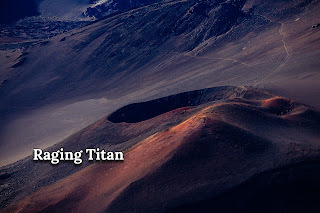
Raging Titan
We arrived at Piazza Garibaldi at nine forty-five in themorning. Tourists were buzzing around holding mobile phones, maps, bottles ofwater and an assortment of sunhats. They were chattering in strict German, musicalSpanish, and discreet Mandarin, and tongues I could not name, looking for theright meeting point in a sea of buses and asking the unwilling rival tourguides for directions in a panic of tourists, traffic chaos and rising summerheat.
“Excuse me,” I asked a smartly dressed man with straightparted hair, “is this the Napoli Giornata to Vesuvius?” His smile deflated, “No,”he said.
“Do you happen to know where their meeting point is?” I triedagain.
His nostrils flickered, “I don’t know,” he interjected in a melodic,deep accent.
“Ok, thanks anyway…” I said, disappointed.
“Any luck?” teased my partner, the corners of his mouth turnedup slightly.
I sighed, “I can’t get how you can be this calm about this.We are already late. We paid two hundred pounds for the trip, and that it’s non-refundable,”I stressed the last two words, “not to mention we won’t have time to book a newtour to Vesuvius if we miss this one.”
“Don’t freak out, they’re not going to leave without us.Let’s keep looking.”
“Ugh, your calmness is very stressful, you know that?” I said,but he only laughed and urged me to keep looking.
It wasn’t easy navigating through excited passengers and scoresof vehicles.
“I just don’t get why they can’t have a sign of the agency onthe side of the windshield so people know which one to board?”
By this time, some of the tour buses were packed and began todepart, decluttering the Piazza, filling the air with the smell of exhaust and mewith the dread of being stranded behind.
A man and a woman in their twenties, who appeared to be acouple, approached us. They moved modestly, through passersby giving way andnodding respectfully, bright-eyed and fair-skinned, with thin blond hair thatquivered in the wind.
“Excuse me,” the young man began, “ we are looking for theNapoli Giornata to Vesuvius, do you know where it is?”
“We’re also looking for it,” I explained. “We have no idea,and those tour guides are not very helpful, are they?”
They smiled, agreed politely, and joined us in our quest. Seeingthat we were not the only ones having difficulty finding the meeting point wasa revelation. I took a deep breath and composed myself. Islets of people werenow gathered around the remaining buses, which eased our path among them andfinally brought us to the Napoli Giornata to Vesuvius meeting point. The signat the bottom left of the windscreen was a welcome sight to my eyes.
“Hello, sorry we are late,” I explained, “it wasn’t easyfinding the meeting point.”
“Not to worry,” said a lean, heavily tanned woman in herthirties, with waist-long jet-black hair. “Names?”
We gave our names and saw her draw large, angular tick signs ona piece of paper with a blue BIC pen. She signalled us in by waving her fingers,giving us the chance to admire her long manicured fingernails. The couple preferredseats near the back of the bus, and we got the ones by the front door. Theother seats were already taken, and the passengers were chatting quietly andexcitedly, checking the itinerary, and adjusting their seats. I noticed the airconditioning was working, but it made a low, grunting, throaty noise like adying asthmatic giant. I hoped it wouldn’t give up on us.
“Ok, ok, your attention please,” she pronounced please as “pleasah”.I stole a glance at my partner, and we exchanged a quick grin.
“Now that we are all here, we can finally begin the ascent toMount Vesuvius. My name is Alessia, and this is our amazing driver, Bito. Sayhello, Bito,” he gave us a wave. “Put your hands together for Bito people,” shewaited until we did. “Bito is the best driver in Napoli,” she assured us. Shewas pleasant and bubbly with a balanced combination of charm and exasperationin her tone. “Anything you need, you come to me. If you need to stop for a toilet,if you feel dizzy, anything-anything, you come to me and I take care of it, OK?Let’s go then.”
Escaping the pandemonium of Naples traffic was challenging,but soon enough, we began ascending the winding, narrow road up to the infamousvolcano. Alessia drew our attention to the bay of Naples while strategicallydumping interesting facts and anecdotes here and there to keep her audiencecaptivated. She seemed particularly excited about the lava flows and the floraof the mountain that draped its slopes in yellow and pinkish bouquets. Morethan halfway up the mountain, a sweaty cyclist seemed to climb slowly andlaboriously up the road. Alessia was not one to keep her opinion to herself.
“You see him?” she asked, pointing. “He is crazy.”
About twenty minutes later, we were at the entrance of thenational park. Before allowing us to get off the bus, Alessia gave us somelast-minute pointers and made abundantly clear, half-jokingly,half-dead-serious, that she would not hesitate to abandon us in the wildernessif we didn’t meet her right on that very spot by noon. “It is very difficult towalk down to Napoli,” she reminded us in her thick accent. We got off the bus,and at once, the heat attacked our cheeks, exposed legs, and gradually everyinch of our bodies, like a wave drenching us in our own sweat. The entrance wasdivided into queues where two young men checked the tickets. One of them showedsome rudimentary effort in validating the tickets, while the other was toopreoccupied with his mobile phone to bother and just gestured us inindifferently. A gravel path snaked all the way up to the caldera, litteredwith volcanic residue of jagged, spongy-looking, pink, porous rocks speckled,here and there, with black, shiny mineral dots. They felt dry and chalky to thetouch, and weighed too little for their size, as if they were filled with air.
“Oh, my,” exclaimed a mother from Ohio, looking up at all theclimbing we were about to undertake, and I had to admit I agreed with her.Alessia smiled, “What? You paid for this…,” she added, grinning, and left it atthat.
One by one, we began to ascend. Wooden poles and thick ropeswere installed along the path, limiting the more adventurous and assisting thosewho needed a bit more help completing the feat. Partners and families huddledtogether for support, sometimes with a word of encouragement, others with akick in the shin from one little sibling to the other for a race to the top.The gravel crunched under our feet, and the rising dust stuck on my blacksneakers like an annoying advertisement jingle you can’t stop singing. The Ohiomum needed a break. She took a blue handkerchief out of her backpack andstarted dabbing her forehead, but she wasn’t the only one.
All around, people were breathing heavily, fanning themselveswith maps, ticket receipts and straw hats. Water bottles and thermoses madetheir appearance in an attempt to fight off the heat and exhaustion of theclimb. Large wet circles formed under armpits, around neck lines, bellies, and lowerbacks on our conquest of Vesuvius. Soon we reached the first “official” stopalong the way: a small shop with a variety of souvenirs. The cold drinkssection was instantly invaded and severely compromised by our attack. Otherslingered over an assortment of fridge magnets with the VESUVIUS logo, flimsy keychains,and even locally sourced wine. I took my time scrutinising a collection ofvolcanic minerals that drew my attention. Chunks of bright yellow sulphur, redquartz, glossy black obsidian, and striking indigo-blue covellite weredisplayed in a well-crafted cardboard box for fifteen euros.
Next to us, a new queue began to form organically, wherepeople were trying to capture Naples spreading along the coast of the gulf,most likely so they could share it on their social media, rub it in otherpeople’s faces and get back something in return for shedding such copiousamounts of sweat.
“Should we get going?” my partner asked, bringing me out ofmy reverie.
“Huh? Yes, yes, let’s do this.”
We had almost reached the top. The trail remained rough andcalled for carefully calculated stepping, but on the other hand, it was nolonger so steep to strain our breath. The rim of the caldera took a moredefined form. With some deliberate observation, you could detect the mostghostly traces of steam lazily evaporating and vanishing in the gentle mountainbreeze.
Here it stood, a chasm expanding like a hungry gaping mouth,still, deceptively serene, and beautiful, but underneath this façade hid araging titan with the power to wipe an entire town off the map. I looked aroundat the faces of my exhausted companions, and I saw their eyes gleaming as they stareddown at the volcano floor, relieved and with a hint of pride in their smilingfaces for having completed the quest.
“It’s beautiful, isn’t it?” my partner asked.
“Hmm, very beautiful,” I agreed.
“It makes you wonder, though, would we even visit if it hadn’tkilled thousands of people?”
“Probably not, we’d never even hear of it.”
“Yeah. Let’s take a selfie.”
Thank you for reading the story. If enjoyed it, I would be grateful to hear your thoughts or questions in the comments below.July 28, 2025
The Lost Postcard

The Lost Postcard
I found itinside his favourite book, I promised him I’d read but never finished because Ididn’t have time. It was sitting on page five hundred and eight. We’ve beenusing museum tickets, plane tickets, postcards, receipts and all sorts ofthings as bookmarks and then forget them there. The next time we rediscoveredthem, they summoned memories to mind, also forgotten.
I picked upthe postcard. The thick paper felt dry against my fingertips, and the colourshad begun to turn a faint sepia shade. The weathered marble statue of adying Achilles, pulling an arrow from his heel, filled the front of thepostcard, and at the bottom, golden letters proclaimed "AchilleionPalace" in an archaic-looking font.
It was thepostcard from the trip to Corfu island, our last holiday. We booked the ticketsfor September because it was cheaper, but it still felt like the heart ofsummer. We caught the bus in Corfu town to Achilleion, where we made our way onfoot to the palace. The cicadas around us drowned out all other sounds,attacking our ears with white noise, while the crisp, resinous aroma of theMediterranean cypress trees filled our lungs.
On our wayout, we visited the souvenir shop, where tourists were browsing a variety ofitems, from keychains and statuettes to handmade soaps made from lavender andherbs, and jewellery fashioned after Empress Sissi of Austria, who hadcommissioned the palace. To commemorate our visit, we got the postcard and anoval pin with Achilles engraved on it to add on the wall.
I placedInfinite Jest on the coffee table. I moved across the study, postcard in hand,towards the northern wall, where, almost two decades ago, I had drawn anoutline of a political world map that covered the surface from top to bottom,with clear borders defining each country using black acrylic paint. Every timewe visited a country, we filled in the corresponding space with colour andsmall memorabilia. Iceland was painted ivory-blue for its glacial ice, and alight red chunk of lava rock we picked up from Kerið Crater was protruding inits midst. Italy was painted light green with a magnet of the Colosseum at itscapital and a miniature Vesuvius right next to Naples. It was a crazy idea ofmine that gave us an excuse to visit the world and become collectors of coloursand culture, a puzzle we craved to piece together.
The pin ofAchilles stood attached on the island of Corfu, in the north-west of Greece,which was painted in the light blue colours of the sea and the sky. Delphi wasrepresented by a wooden sphynx, and a marble fridge magnet of the Acropolistowered over Athens. The magnet was so heavy it had fallen countless timesuntil it broke in half; we had to superglue it back together and then to thewall to secure it.
The medleyof textures and hues produced a vivid visual mosaic, which contrasted with theemptiness of the unexplored countries. Our love for manga, bonsai, picturesquecherry blossoms, and the dramatic waves of Katsushika Hokusai drew us to Japanas our next destination. But before our excursion we needed to save because thetrip was going to be long and costly. That didn’t dishearten him, however;instead, he said it was all for the best because we would get the chance tolearn some Japanese before we left. And then our plans got interrupted, and thefour islands of the Japanese Archipelago remained blank.
It's funnyhow things sometimes turn out, realising how out of our control our lives trulyare, even when we pretend we’re on top of things and schedule entries in ourcalendars of obligations and things to come. I was at work when I received thecall. It was as if the world had lost its cadence and the earth retreatedbeneath my feet. What was the man on the phone saying? He was offering someformulaic kind words, the sort one hears in a news statement after a planecrash or a catastrophic bridge collapse.
“What?” Iasked.
Themonotonous voice of the caller spoke more words, words that didn’t seem to makesense at first because the stillness inside my chest drowned them out.
“I see. Yes,I understand. Which hospital? Yes, yes, thank you”. I ended the call.
Fiveidentical walnut desks around the office screamed with laughter and bustlingcolleagues going about their business, but an invisible barrier grounded myears in a consuming tinnitus buzz. The days after the accident are stillundefined in my mind as if waking up from a deep sleep, blurred-eyed,stumbling, disorientated flashbacks of images behind wet window frames. I spentthem sitting on the sofa, staring at the incomplete wall map, the missingcountries that would never earn their mementoes and distinctive colours, andremain empty.
Time passed.His scent slowly faded from his pillow, the bonsai tree we had grown from theseed of the great oak tree in Campbell Park, withered, and I needed to feel himagain. He was my Infinite Jest. I fished his favourite book and came across thepostcard, which now rested in my arms.
I reachedfor a pushpin from the desk drawer and attached the postcard in the centre ofthe map.
Thank you for reading the story. If you enjoyed it, I would be grateful to hear your thoughts or questions in the comments below.The lostpostcard I found itinside his favourite book, I p...
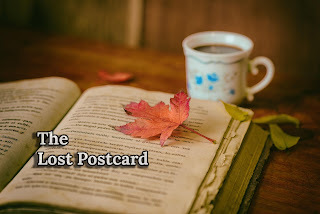
The lostpostcard
I found itinside his favourite book, I promised him I’d read but never finished because Ididn’t have time. It was sitting on page five hundred and eight. We’ve beenusing museum tickets, plane tickets, postcards, receipts and all sorts ofthings as bookmarks and then forget them there. The next time we rediscoveredthem, they summoned memories to mind, also forgotten.
I picked upthe postcard. The thick paper felt dry against my fingertips, and the colourshad begun to turn a faint sepia shade. The weathered marble statue of adying Achilles, pulling an arrow from his heel, filled the front of thepostcard, and at the bottom, golden letters proclaimed "AchilleionPalace" in an archaic-looking font.
It was thepostcard from the trip to Corfu island, our last holiday. We booked the ticketsfor September because it was cheaper, but it still felt like the heart ofsummer. We caught the bus in Corfu town to Achilleion, where we made our way onfoot to the palace. The cicadas around us drowned out all other sounds,attacking our ears with white noise, while the crisp, resinous aroma of theMediterranean cypress trees filled our lungs.
On our wayout, we visited the souvenir shop, where tourists were browsing a variety ofitems, from keychains and statuettes to handmade soaps made from lavender andherbs, and jewellery fashioned after Empress Sissi of Austria, who hadcommissioned the palace. To commemorate our visit, we got the postcard and anoval pin with Achilles engraved on it to add on the wall.
I placedInfinite Jest on the coffee table. I moved across the study, postcard in hand,towards the northern wall, where, almost two decades ago, I had drawn anoutline of a political world map that covered the surface from top to bottom,with clear borders defining each country using black acrylic paint. Every timewe visited a country, we filled in the corresponding space with colour andsmall memorabilia. Iceland was painted ivory-blue for its glacial ice, and alight red chunk of lava rock we picked up from Kerið Crater was protruding inits midst. Italy was painted light green with a magnet of the Colosseum at itscapital and a miniature Vesuvius right next to Naples. It was a crazy idea ofmine that gave us an excuse to visit the world and become collectors of coloursand culture, a puzzle we craved to piece together.
The pin ofAchilles stood attached on the island of Corfu, in the north-west of Greece,which was painted in the light blue colours of the sea and the sky. Delphi wasrepresented by a wooden sphynx, and a marble fridge magnet of the Acropolistowered over Athens. The magnet was so heavy it had fallen countless timesuntil it broke in half; we had to superglue it back together and then to thewall to secure it.
The medleyof textures and hues produced a vivid visual mosaic, which contrasted with theemptiness of the unexplored countries. Our love for manga, bonsai, picturesquecherry blossoms, and the dramatic waves of Katsushika Hokusai drew us to Japanas our next destination. But before our excursion we needed to save because thetrip was going to be long and costly. That didn’t dishearten him, however;instead, he said it was all for the best because we would get the chance tolearn some Japanese before we left. And then our plans got interrupted, and thefour islands of the Japanese Archipelago remained blank.
It's funnyhow things sometimes turn out, realising how out of our control our lives trulyare, even when we pretend we’re on top of things and schedule entries in ourcalendars of obligations and things to come. I was at work when I received thecall. It was as if the world had lost its cadence and the earth retreatedbeneath my feet. What was the man on the phone saying? He was offering someformulaic kind words, the sort one hears in a news statement after a planecrash or a catastrophic bridge collapse.
“What?” Iasked.
Themonotonous voice of the caller spoke more words, words that didn’t seem to makesense at first because the stillness inside my chest drowned them out.
“I see. Yes,I understand. Which hospital? Yes, yes, thank you”. I ended the call.
Fiveidentical walnut desks around the office screamed with laughter and bustlingcolleagues going about their business, but an invisible barrier grounded myears in a consuming tinnitus buzz. The days after the accident are stillundefined in my mind as if waking up from a deep sleep, blurred-eyed,stumbling, disorientated flashbacks of images behind wet window frames. I spentthem sitting on the sofa, staring at the incomplete wall map, the missingcountries that would never earn their mementoes and distinctive colours, andremain empty.
Time passed.His scent slowly faded from his pillow, the bonsai tree we had grown from theseed of the great oak tree in Campbell Park, withered, and I needed to feel himagain. He was my Infinite Jest. I fished his favourite book and came across thepostcard, which now rested in my arms.
I reachedfor a pushpin from the desk drawer and attached the postcard in the centre ofthe map.
Thank you for reading the story. If enjoyed it, I would be grateful to hear your thoughts or questions in the comments below.The lostpostcard I found itinside his favourite book, I ...
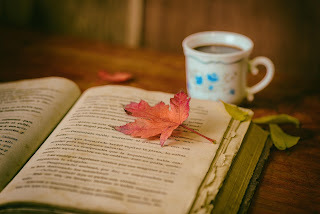
The lostpostcard
I found itinside his favourite book, I promised him I’d read but never finished because Ididn’t have time. It was sitting on page five hundred and eight. We’ve beenusing museum tickets, plane tickets, postcards, receipts and all sorts ofthings as bookmarks and then forget them there. The next time we rediscoveredthem, they summoned memories to mind, also forgotten.
I picked upthe postcard. The thick paper felt dry against my fingertips, and the colourshad begun to turn a faint sepia shade". The weathered marble statue of adying Achilles, pulling an arrow from his heel, filled the front of thepostcard, and at the bottom, golden letters proclaimed "AchilleionPalace" in an archaic-looking font.
It was thepostcard from the trip to Corfu island, our last holiday. We booked the ticketsfor September because it was cheaper, but it still felt like the heart ofsummer. We caught the bus in Corfu town to Achilleion, where we made our way onfoot to the palace. The cicadas around us drowned out all other sounds,attacking our ears with white noise, while the crisp, resinous aroma of theMediterranean cypress trees filled our lungs.
On our wayout, we visited the souvenir shop, where tourists were browsing a variety ofitems, from keychains and statuettes to handmade soaps made from lavender andherbs, and jewellery fashioned after Empress Sissi of Austria, who hadcommissioned the palace. To commemorate our visit, we got the postcard and anoval pin with Achilles engraved on it to add on the wall.
I placedInfinite Jest on the coffee table. I moved across the study, postcard in hand,towards the northern wall, where, almost two decades ago, I had drawn anoutline of a political world map that covered the surface from top to bottom,with clear borders defining each country using black acrylic paint. Every timewe visited a country, we filled in the corresponding space with colour andsmall memorabilia. Iceland was painted ivory-blue for its glacial ice, and alight red chunk of lava rock we picked up from Kerið Crater was protruding inits midst. Italy was painted light green with a magnet of the Colosseum at itscapital and a miniature Vesuvius right next to Naples. It was a crazy idea ofmine that gave us an excuse to visit the world and become collectors of coloursand culture, a puzzle we craved to piece together.
The pin ofAchilles stood attached on the island of Corfu, in the north-west of Greece,which was painted in the light blue colours of the sea and the sky. Delphi wasrepresented by a wooden sphynx, and a marble fridge magnet of the Acropolistowered over Athens. The magnet was so heavy it had fallen countless timesuntil it broke in half; we had to superglue it back together and then to thewall to secure it.
The medleyof textures and hues produced a vivid visual mosaic, which contrasted with theemptiness of the unexplored countries. Our love for manga, bonsai, picturesquecherry blossoms, and the dramatic waves of Katsushika Hokusai drew us to Japanas our next destination. But before our excursion we needed to save because thetrip was going to be long and costly. That didn’t dishearten him, however;instead, he said it was all for the best because we would get the chance tolearn some Japanese before we left. And then our plans got interrupted, and thefour islands of the Japanese Archipelago remained blank.
It's funnyhow things sometimes turn out, realising how out of our control our lives trulyare, even when we pretend we’re on top of things and schedule entries in ourcalendars of obligations and things to come. I was at work when I received thecall. It was as if the world had lost its cadence and the earth retreatedbeneath my feet. What was the man on the phone saying? He was offering someformulaic kind words, the sort one hears in a news statement after a planecrash or a catastrophic bridge collapse.
“What?” Iasked.
Themonotonous voice of the caller spoke more words, words that didn’t seem to makesense at first because the stillness inside my chest drowned them out.
“I see. Yes,I understand. Which hospital? Yes, yes, thank you”. I ended the call.
Fiveidentical walnut desks around the office screamed with laughter and bustlingcolleagues going about their business, but an invisible barrier grounded myears in a consuming tinnitus buzz. The days after the accident are stillundefined in my mind as if waking up from a deep sleep, blurred-eyed,stumbling, disorientated flashbacks of images behind wet window frames. I spentthem sitting on the sofa, staring at the incomplete wall map, the missingcountries that would never earn their mementoes and distinctive colours, andremain empty.
Time passed.His scent slowly faded from his pillow, the bonsai tree we had grown from theseed of the great oak tree in Campbell Park, withered, and I needed to feel himagain. He was my Infinite Jest. I fished his favourite book and came across thepostcard, which now rested in my arms.
I reachedfor a pushpin from the desk drawer and attached the postcard in the centre ofthe map.
February 25, 2016
Make a Dream Come TrueYou can make a dream come true only...
You can make a dream come true only by chipping in $1 dollar! We need your help here to make this happen. Our goal is to professionally publish one of the most amazing and fascinating book series for teenagers and young adult.We have the adventurous story, we have the brave and complicated characters, we have the mythical and magical places, we have the mystery and plot but we are missing amazing people like you to help us bring it to life professionally.There are many pledges and many different awards for everyone. You can just start with 1 dollar, or with 5 dollars. If you are feeling more generous you can go for 5 dollars or 10. If you are feeling super helpful you can just chip in with 20 or 40 dollars. If you have a lot of money to spare and want to help us as a part of the team, you have the chance to pledge for 80, 100 and 150 dollars! Isn't it great?Please do take a look at the link below and if you think you cannon help by donating, then please do the next best thing: share - share - share! Sharing is always good, do a good thing today, share this campaign with your friends and family. Share it on Facebook, Twitter, Google Plus or anywhere else, to help us have the right promotion for our work.
FOR MORE INFORMATION PLEASE CLICK HERE
This project is very important to us and we want to share it with the world, we want to offer you the best possible sample of our work but in order to do that we need your support for professional editing, professional proofreading, professional formatting of the manuscript for physical but also digital editions. Professional cover design and of course, the most important of all: Promoting.Because no matter how amazing and good the book is, promotion is key element to make it successful. Promotion will bring in readers and readers will leave reviews and the more the positive reviews the more likely it is for the readers to purchase your book. So please if you can't give any pledges, just share and share and you will do more than enough.
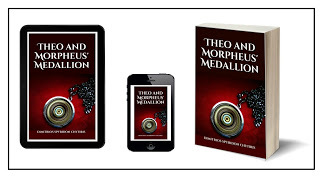
Thank you so much for reading this and thank you so much for posting this to your social media so more people get to see our work and help us bring it to life.Stay tuned, I will be posting news on how the campaign is going every other day. Just keep sharing!
February 4, 2016
The Twelve Gods are exiledbut someoneis scheming to rule ...
Theo is avery special boy, in fact he is more than just a boy; he is a demigod withamazing powers. After returning home one evening, he finds two strangerstalking to his parents: “The boy is our only hope” the man in black said “he isthe only one who can summon the Twelve and save the world of the mortals fromenslavement and destruction”.Theo sets offin a quest to restore order and stop the evil Daemon gods from taking over theworld of men. In his journey he must overcome the dangers and difficulties withbravery and wisdom, if he wishes to complete the Three Trials successfully andbecome a Champion of the Gods. Thankfully he is not alone; his brave youngGuardians accompany him in a search of six Divine Keys that have the power tounlock the Seals that keep the Twelve Gods exiled in another dimension.
Adventure,magic, friendship and mystery are some of the elements of this great read thatcan only be compared to the magnitude of the Harry Potter series and theoriginality of Percy Jackson.
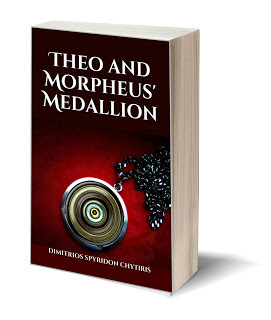
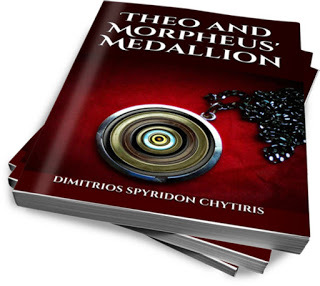
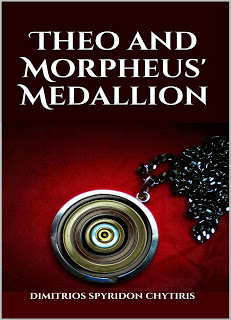
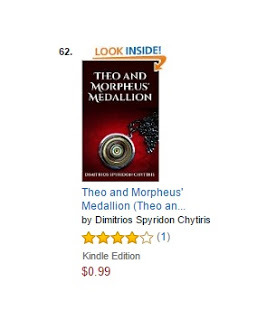 You want to buy the perfect gift for your children or any special young reader? Follow the links below and gift more than just a book, gift a journey to a world of wondering and adventure.
You want to buy the perfect gift for your children or any special young reader? Follow the links below and gift more than just a book, gift a journey to a world of wondering and adventure.Book available in physical and digital forms.
Amazon: http://goo.gl/YG0DUI
Amazon UK: http://goo.gl/zgTsnC
Amazon CA: http://goo.gl/9ZOUGm
Amazon AU: http://goo.gl/1UUreI
Amazon IN: http://goo.gl/nQGMcZ
Amazon DE: http://goo.gl/37nJEX
The Twelve Gods are exiledbut someone is scheming to rule...
Theo is a very special boy, in fact he is more than just a boy; he is a demigod with amazing powers. After returning home one evening, he finds two strangers talking to his parents: “The boy is our only hope” the man in black said “he is the only one who can summon the Twelve and save the world of the mortals from enslavement and destruction”.Theo sets off in a quest to restore order and stop the evil Daemon gods from taking over the world of men. In his journey he must overcome the dangers and difficulties with bravery and wisdom, if he wishes to complete the Three Trials successfully and become a Champion of the Gods. Thankfully he is not alone; his brave young Guardians accompany him in a search of six Divine Keys that have the power to unlock the Seals that keep the Twelve Gods exiled in another dimension.
Adventure, magic, friendship and mystery are some of the elements of this great read that can only be compared to the magnitude of the Harry Potter series and the originality of Percy Jackson.



 You want to buy the perfect gift for your children or any special young reader? Follow the links below and gift more than just a book, gift a journey to a world of wondering and adventure.
You want to buy the perfect gift for your children or any special young reader? Follow the links below and gift more than just a book, gift a journey to a world of wondering and adventure.Book available in physical and digital forms.
Amazon: http://goo.gl/YG0DUI
Amazon UK: http://goo.gl/zgTsnC
Amazon CA: http://goo.gl/9ZOUGm
Amazon AU: http://goo.gl/1UUreI
Amazon IN: http://goo.gl/nQGMcZ
Amazon DE: http://goo.gl/37nJEX
Theo and Morpheus' Medallion book!
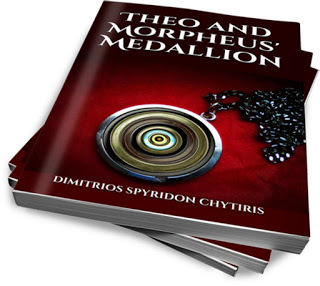
Let's make it #1 ! Good morning great friends, my book is currently at #62 in Amazon (Greek and Roman). For only 99c you can help us make it climb all the way up to #1 !!!Don't just wait there, take advantage of this unique opportunity to purchase Theo and Morpheus' Medallion, being #1 of the Theo and The Six Seals Series, for only 99 cents American.
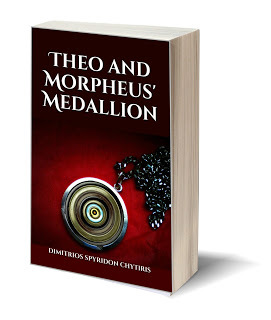
You can find the book in both physical and digital form, for your bookcase for your personal computer, for your tablet and for your phone where you can read it anytime and anywhere.
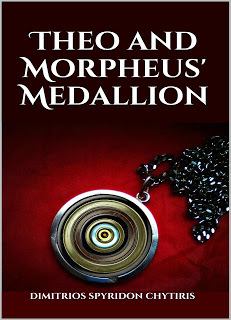
Links where you can take advantage of this amazing offer:
Amazon: http://goo.gl/YG0DUI
Amazon UK: http://goo.gl/zgTsnC
Amazon CA: http://goo.gl/9ZOUGm
Amazon AU: http://goo.gl/1UUreI
Amazon IN: http://goo.gl/nQGMcZ
Amazon DE: http://goo.gl/37nJEX
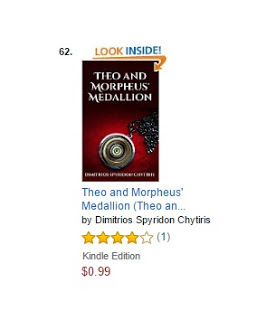 And don't forget to leave a review so that more people can experience the magical feeling of reading a book that travels the reader to new and ancient places, adventure, fantasy, mythical creatures and fun!
And don't forget to leave a review so that more people can experience the magical feeling of reading a book that travels the reader to new and ancient places, adventure, fantasy, mythical creatures and fun!



